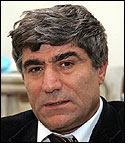Cameroon: government crackdown
Journalists at Cameroon Radio and Television (CRTV) have been warned by management not to cover criticism of constitutional change.
Journalists at Cameroon Radio and Television (CRTV) have been warned by management not to cover criticism of constitutional change.
 The alleged killers of journalist Hrant Dink return to court today, with many groups expressing misgivings about the conduct of their trial, writes Charlotte Alfred
The alleged killers of journalist Hrant Dink return to court today, with many groups expressing misgivings about the conduct of their trial, writes Charlotte Alfred
The fourth hearing in the trial of suspects accused of killing Hrant Dink, the Turkish-Armenian editor of Agos, starts today in Istanbul, amid widespread concern over the inadequacy of the Turkish investigation into the murder.
Dink was assassinated outside the newspaper’s offices in Istanbul on 19 January 2007. Ogun Samast, a teenage ultra-nationalist, was arrested the day after the murder and reportedly confessed to the killing. A total of 18 suspects, including Samast, were later charged with planning and organising the murder.
Over more than a year of investigations, Turkish and European lawyers and human rights organisations have stressed the importance of a fair and transparent process, and highlighted the case as a test of the rule of law in Turkey.
Documentary screening and panel discussion
For Hrant, for Justice: the ongoing struggle for freedom of expression in Turkey
7pm Thursday 28 February 2008
Amnesty International UK – The Human Rights Action Centre
 Despite the government’s best efforts, television and electronic media had a profound effect on how Pakistanis voted in this week’s election, says Zubeida Mustafa
Despite the government’s best efforts, television and electronic media had a profound effect on how Pakistanis voted in this week’s election, says Zubeida Mustafa
Two days before the elections in Pakistan on 18 February, the New York-based Human Rights Watch (HRW) gave a scathing indictment of the state of media freedom in the country. HRW expressed concern at what it saw as limits on the public’s right of information which would “undermine the chances that Pakistan will have free and fair elections.”
When polling day arrived, these apprehensions largely proved to be unfounded. The press, which has of late escaped the government’s rigorous scrutiny, did not by and large feel unduly curbed. In a country with less than 50 per cent literacy, and newspapers with circulation not exceeding four digits, the government now probably feels it has nothing to fear from the printed word.
If an authoritarian government feels threatened by the free flow of information, its fears are now directed at the electronic media. Eighty private television channels have mushroomed in Pakistan in the last few years — with the government’s permission of course — ever since President Musharraf’s regime decided to end the monopoly of the state-owned Pakistan Television Corporation and give licenses to private stations. Initially they were given a free run and no attempt was made to regulate them. But when their “activism” and dynamic reporting of events — especially the anti-Musharraf lawyers’ movement last year — began to hurt the regime it cracked down with a heavy hand on them.